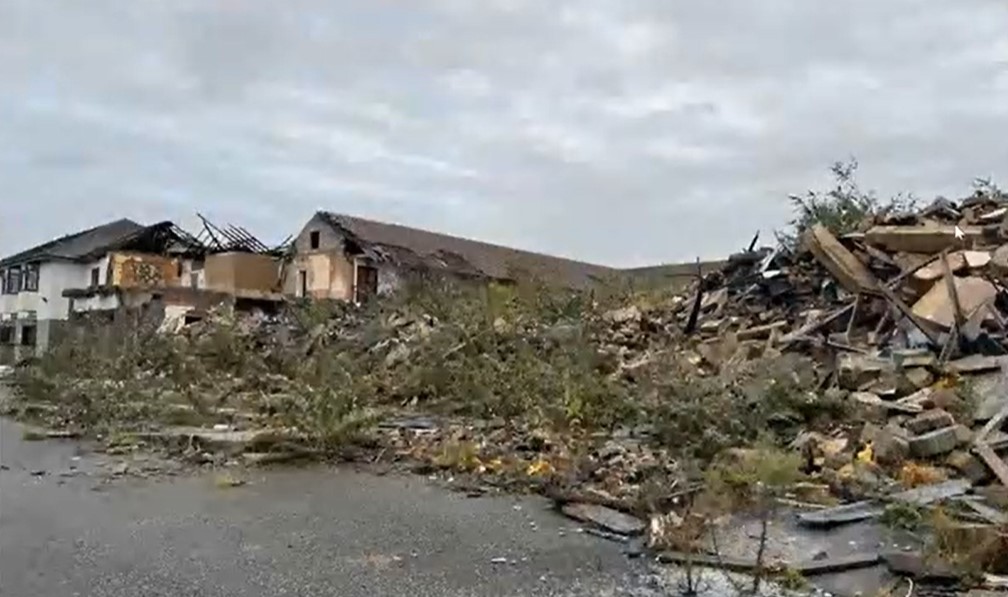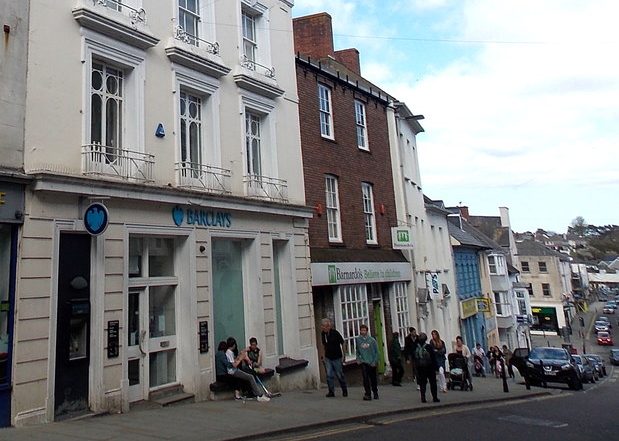Community
Police team up with Health Board to combat mental illness

PC Thomas and mental health practitioner, Edward McHugh: Supported
by a team of 11 officers who have received training.ill
DYFED-POWYS POLICE and Hywel Dda University Health Board have joined forces to help people in mental distress over Christmas, and reduce the amount of times police cells are used as places of safety for those waiting to be assessed. A triage service has been operating for the last two weekends, and will also be available this weekend. The service, based in Carmarthen Police HQ is led by PC Celt Thomas and mental health practitioner, Edward McHugh. They are supported by a team of 11 officers who have received training.
The team have access to police and health records, and are able to provide background information to officers so they can provide specific assistance to people who need tailored help. Most information and advice will be provided to officers remotely, via telephone or police radio contact. The service also aims to reduce the use of Section 136 of the Mental Health Act and to provide better signposting and pathways into services for people following incidents. Evidence from the national pathfinder triage pilots show that having a mental health triage service significantly reduces the number of Section 136 detentions.
The practical benefits of mental health triage include access to patient records, information, intelligence, and specialist advice to enable better decision-making at the scene of incidents, a range of tactical options being made available to police officers as alternatives to detentions under Section 136 of the Mental Health Act, proactive signposting and referral to wide range of services and better communication between agencies. Det Superintendent Andy John said: “This isn’t the first time we have worked together to provide this service. Last December, we ran the service for four evenings in December.
“It resulted in providing information and advice to officers in relation to 34 incidents, averting two Section 136 detentions and supporting an elderly couple to remain at home. Without the service, both would almost certainly have been admitted to hospital for different reasons. Referring vulnerable people for additional services and support, including young people, enabling direct admission to residential Mental Health wards. As a result of this, Dyfed Powys Police and Hywel Dda University Health Board agreed to formally pilot the service for a year, and established a Project Board to develop and oversee the pilot.
Karen Howell, Chief Executive (Interim) of Hywel Dda University Health Board said: “The street triage service is a fantastic example of prudent healthcare – healthcare that fits the needs and circumstances of patients whilst avoiding wasteful care not to the patients benefit. By working together, different organisations will provide a more timely assessment of a person’s mental health and a more positive experience for the times when they come into contact with a police officer.”
Dyfed-Powys Police and Crime Commissioner Christopher Salmon, who secured Home Office funding of £90,000 for the new service, said: “I want to help vulnerable people – and this practical and useful service will do that. “This service provides an appropriate service to people in mental distress at the earliest opportunity – and will save time and money for the police, ambulance and health services. “It offers new support to individuals at a time when they’re particularly vulnerable and will help Dyfed- Powys Police and others become more effective on the front line.”
Key partners on the project board include: Dyfed Powys Police; Hywel Dda University Health Board; Carmarthenshire, Pembrokeshire & Ceredigion Local Authorities; West Wales Action for Mental Health; University of South Wales and the Welsh Ambulance Service The Triage service will be formally evaluated by a postgraduate student of the University of South Wales, who will undertake both a quantitative and qualitative evaluation with service users. The student is also a service user, and has shared her experiences with Project Board member in order to shape and enhance the service.
Community
Be wary of gulls as breeding season approaches

AS families across Wales head to the seaside for the bank holiday weekend, a national trade body is urging people to be wary of gulls as their egg-laying season gets underway.
During the breeding season, gulls have been known to launch attacks on people, says British Pest Control Association (BPCA).
After mating and nest-building in February and March, many gulls will be protecting nests and eggs towards the end of April and into May.
However, BPCA is also reminding people that avoiding gulls wherever possible is always the best course of action as interfering with wild birds, their eggs or nests could lead to prosecution.
The Wildlife and Countryside Act 1981 states that all wild birds and their eggs are protected, but people with the appropriate knowledge on licences, such as BPCA members, can take steps if the birds are causing a public health and safety concern.
Natalie Bungay, Technical Manager at BPCA, said: “We love British birds. All wild birds and their eggs are rightfully protected by law in the UK, so it is absolutely vital that holidaymakers, householders or business owners don’t interfere with them.
“However, gulls can pose a serious safety concern. They have been known to attack people unexpectedly, which can be a frightening experience, especially if they draw blood, which can occasionally happen.
“We often think of gulls as a coastal problem – which they can be in seaside towns where people have fed them regularly. But for some time now they have also been an increasing problem in towns and cities away from the coast too.”
Gulls can live for 25 to 30 years and many weigh around 1kg, with wingspans of around one metre.
Seaside visitors can try to avoid attracting gulls by ensuring picnic foods or chippy take-aways are kept covered or eaten out of sight of gulls where possible.
Nesting gulls can cause problems for homes and businesses both on the coast and inland, as well as at supermarkets and hospitals, as these buildings can offer ideal nesting sites which are difficult to access and proof.
Nests can clog gutters or chimneys, which may cause water overflows, or potential issues with carbon monoxide, as well as bringing a risk of secondary infestation from bird mites, ticks, fleas and beetles.
Properties are also at risk from bird droppings, which can carry some harmful bacteria and diseases, as well as even cause slips, trips and falls where they build up.
Natalie added: “Gulls are also protected by the law, so it really is important to seek professional help.
“BPCA members are trained in bird control and will be able to offer a management plan that will alleviate the issue.
“There are a variety of bird-proofing measures available, all of which will deter birds without causing them harm, and as gulls are large and heavy, any proofing measures need to be suitable for the job, very heavy duty and correctly installed by a professional.
“Bird prevention, proofing and control is a highly specialised area requiring specific equipment and techniques. Pest professionals are required to try all reasonably practicable non-lethal bird control methods before they consider lethal control.
“Always consult a BPCA member before considering any form of bird management. You could be prosecuted if you illegally interfere with a bird, its nest or eggs.”
BPCA members are trained, experienced professionals with access to a range of specialist products not available to the public, as well as being regularly assessed to the British Standard in Pest Management BS EN 16636.
BPCA members are also endorsed by the Government via the TrustMark quality scheme.
To find a professional pest controller visit bpca.org.uk/find
Community
Social housing plans for Cleddau Bridge Hotel site backed

A SCHEME to build 38 affordable and social housing units on the site of a fire-ravaged former Pembrokeshire hotel has been backed by senior Pembrokeshire councillors.
Pembrokeshire County Council’s Cabinet, meeting on April 22, supported a contract with developer Castell Group Ltd for the mix of affordable homes and social housing units at the Cleddau Bridge Hotel site, Pembroke Dock.
Members, in a report presented by Cabinet Member for Planning & Housing Delivery Cllr Jon Harvey, heard Castell had approached the council’s housing service to determine whether there is an interest in working with them to bring forward the development as a social/affordable housing site.
Castell Construction Ltd specialises in the construction of affordable / social housing, typically for registered social landlords across south Wales, and hopes to build 12 one-bedroom flats, 15 two-bed houses, five three-bed, two four-bed, and four two-bed bungalows.
The development package would be part-funded from the housing revenue account, the remainder from the Social Housing Grant and/or second homes premium for affordable housing if it becomes available for the Housing Service to use in this manner.
Cllr Harvey – who moved approval – said the scheme was expected to provide £230,000 a year in rentals income, describing it as “an excellent opportunity to work with a proven developer for extra social housing in an area of proven need.”
Deputy Leader Cllr Paul Miller said he was supportive of the scheme, as was local member Cllr Joshua Beynon, saying: “It’s a bit of an eyesore at the moment, if we can bring this site back into meaningful use, and in an area where there is a need, I’m all in support of this.”
Members backed senior officers be delegated powers to enter into the works contract, and to have powers to proceed with the land acquisition.
If a subsequent planning permission is secured for the site, the homes could be built by autumn 2026.
In a prime location at one of the entrances to Pembroke Dock, the former Cleddau Bridge Hotel has been derelict since a fire in March 2019, which brought emergency services from as far afield as Ammanford, Aberystwyth and Swansea.
Community
County Hall to offer space for community banking

A CALL for Pembrokeshire County Council to potentially change its banking arrangement with Barclays, after it closed its Haverfordwest branch has been turned down, but County Hall is to offer space for community banking.
Barclays Bank, on the town’s High Street, is to close on May 10.
The council has had a banking services contract with Barclays since 2013.
Councillor Huw Murphy, in a notice of motion heard by Pembrokeshire County Council’s Cabinet meeting of April 22, asked the council to review its banking arrangements with Barclays following the announced closure.
e said the loss of a branch “not only impacts upon town centres and businesses but also disproportionately impacts the elderly who are less likely to embrace on-line banking options”.
A report for Cabinet members said, in terms of the impact on Pembrokeshire residents, Barclays has said that it is “not leaving Haverfordwest and [will] continue to provide face-to-face support for those who need it” via community locations.
Two options were presented to Cabinet: to retender the banking services contract, and, the favoured, to work with Barclays to ensure a community location is set up in Haverfordwest.
Members heard the costs associated with moving to a new banking service provider could be in excess of £50,000.
For the second, favoured option, members heard Barclays was in discussions with the council about a location for potential community banking.
Cabinet Member for Corporate Finance Cllr Alec Cormack, after outlining the risks in the report for members, and moving the notice be not adopted, said he had “considerable sympathy” with Cllr Murphy’s notice.
He told councillors there was a glimmer of light for banking arrangements in the county, with an agreement now signed for two ground floor rooms at County Hall, Haverfordwest, to be used for community banking.
From April 25, the rooms will be available on Wednesdays, Thursdays, and Fridays, members heard.
Cabinet Member for Planning & Housing Delivery Cllr Jon Harvey also said he had “a lot of sympathy” for the motion, adding: “It’s excellent news a deal has been struck to occupy the ground floor rooms three days a week; hopefully this will mitigate, to a certain amount, the closure.
“If we can work with the respective banks to get a community-type approach let’s move forward.”
-

 News5 days ago
News5 days agoPolice issue update on the search for Luke, missing from Pembroke Dock
-

 News13 hours ago
News13 hours agoPolice and air ambulances at ‘serious incident’ at West Wales school
-

 Sport6 days ago
Sport6 days agoHerbrandston Clinch Promotion to Division One
-

 News4 days ago
News4 days ago20mph U-turn: Some roads will return to 30mph following public outcry
-

 Community5 days ago
Community5 days agoMiracle pup finds her forever home after heart-wrenching journey
-

 Community2 days ago
Community2 days agoCounty Hall to offer space for community banking
-

 Crime3 days ago
Crime3 days agoBrian Davis: Wanted on suspicion of commercial burglary
-

 News7 days ago
News7 days agoFirst step towards council tax and business rate reform



























